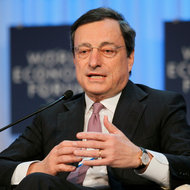BERLIN — Germans sleep better, Bismarck once said, when they don’t know how sausages and laws are made.
A century and a half later, Chancellor Angela Merkel seems to be modeling an election campaign on the musings of Bismarck, the “Iron Chancellor.” She is avoiding detailed discussion of what she would do with a third term, emphasizing instead her personal appeal over policy prescriptions.
In five weeks, Germans will vote in what has been billed as the most important election of the year in Europe, a continent struggling to emerge from years of financial and economic crisis. Yet there is virtually no debate about the major problems facing Germany — like handling its departure from nuclear energy, the aging of its population and articulating a vision for the euro zone.
Differences between the major parties are also hard to identify. Ms. Merkel has pushed her Christian Democrats so close to the opposition Social Democrats and Greens on energy, wages and family policy that the parties have become virtually indistinguishable for many voters.
This has given the parliamentary election campaign a surreal feel. There is no doubt that it is finally under way: Colorful party posters in the streets and Ms. Merkel’s first week of rallies, after her return from an Alpine hiking vacation, attest to that.
But there is no excitement in the air. The opinion polls showing the conservatives with a comfortable lead over the Social Democrats have barely budged for months.
As so often happens in Germany, a new word — Nichtwahlkampf, or noncampaign — has cropped up in the media to describe the state of affairs.
Compounding the angst have been two studies, from the Friedrich Ebert Foundation and the Bertelsmann Foundation, showing a sharp drop in German voter participation.
According to the Friedrich Ebert study, 18 percent fewer Germans vote in national elections than did three decades ago, the second-largest decline among West European democracies after Portugal.
At about 70 percent, Germans still vote at a higher rate than their counterparts in Britain and the United States, at 65 percent and 57 percent, respectively. But that hasn’t prevented soul-searching, with Germans asking whether the absence of political debate represents a threat to democracy itself.
“One reason people are voting less is that the parties have become so similar,” said Klaus-Peter Schöppner, the head of the polling institute Emnid. “The big ones no longer distinguish themselves from each other on the important issues.” In the early 1990s, Mr. Schöppner says, about 30 percent of Germans said it made no difference to them whether the Christian Democrats or Social Democrats were in government. Now that figure stands at a stunning 70 percent.
Last month, President Joachim Gauck, who traditionally steers clear of domestic politics, publicly chastised German lawmakers for failing to articulate their policy differences.
“Those who avoid clarity today are creating the nonvoters of tomorrow,” said Mr. Gauck, a former Lutheran pastor and East German dissident.
Asked last week about that, Ms. Merkel was dismissive. “If there are similarities between the parties, that is not such a bad thing,” she said. “I don’t think the people want to hear about differences all the time. They just want their problems solved.”
It would be unfair to put all the blame for rising voter apathy on Ms. Merkel, said Mr. Schöppner and Manfred Güllner, head of the Forsa research institute.
A major factor, they argue, is the increasingly fractured party landscape that has forced politicians to contemplate coalitions that would have been unthinkable in the past.
In this new world, voters can back the Social Democrats or the Greens only to see their party of choice end up in a partnership with the traditional archenemy, Ms. Merkel’s conservatives. That has convinced some Germans that there is no point in showing up on election day.
Another explanation is a growing sense that politicians are looking out for themselves instead of working for the public good, Mr. Güllner says.
That feeling has deepened with a series of scandals. Two of Ms. Merkel’s ministers were forced to resign for plagiarizing their doctoral theses. The campaign of her Social Democrat challenger Peer Steinbrück got off to a disastrous start when it emerged that he had made €1.2 million, or $1.6 million, in speaking fees while he was a member of Parliament. Now many dismiss him as greedy.
Another reason why voters are tuning out may be the complexity of the issues. Many simply do not understand the ins and outs of the euro zone crisis, the intricacies of shifting from nuclear power to renewable energy or the details of online surveillance by the U.S. National Security Agency.
“Who really understands what is going on there? And who really understands what politicians are calling for on these issues?” Mr. Schöppner asked.
Ms. Merkel’s response is to keep things simple, like Bismarck.
At her first major campaign rally last week, she skated over the surface of the issues. Speaking in Seligenstadt, a medieval town near Frankfurt, Ms. Merkel barely touched on Europe and made no mention of the biggest policy initiative of her second term — the Energiewende, or energy shift.
Her popularity ratings of about 60 percent are the envy of other leaders in Europe. Still, it is difficult to find a German who is genuinely enthusiastic about Ms. Merkel. Her monotone 25-minute speech in Seligenstadt left even the most ardent supporters cold.
But she does represent stability, security and continuity. According to a new book “The German: Angela Merkel and Us” by Ralph Bollmann, she is in “perfect sync” with the national mood.
She does not overburden Germans with detail. What she lacks in vision and inspiration, she makes up for in trust.
Strip the pageantry and policy out of an election campaign, and all you have left is the person. That may mean fewer voters show up Sept. 22, but the outcome is not in doubt.
Noah Barkin is the Berlin bureau chief for Reuters.

Article source: http://www.nytimes.com/2013/08/20/business/global/economy-is-a-casualty-in-germanys-noncampaign.html?partner=rss&emc=rss



